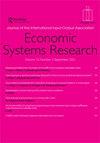论欧元法
IF 1.6
4区 经济学
Q2 ECONOMICS
引用次数: 4
摘要
本文严格审查了欧元方法的使用,以更新供应和使用表(SUT)和/或投入产出表。它只适用于不必要的聚合和对称SUT(而不是其基本的矩形版本),这已经是一个令人担忧的问题。然而,通过分析研究欧元对SUT要素调整的性质,并实证评估其一些基本假设,包括新揭示的假设,得出的结论是,欧元方法在很大程度上是一个临时更新程序。在没有工业产出的情况下,它最近声称的优于广义RAS方法(GRAS,或SUT-RAS)的优势受到了挑战。结果表明,在这种有限的数据可用性环境下,在外部给定工业产出估计的情况下应用标准GRAS仍然优于Euro方法。本文章由计算机程序翻译,如有差异,请以英文原文为准。
On the Euro method
This paper critically examines the Euro method usage for the purposes of updating supply and use tables (SUTs) and/or input–output tables. Its known restricted applicability to only unnecessarily aggregated and symmetric SUTs (and not their underlying rectangular versions) is already an issue of concern. However, by studying analytically the nature of Euro's adjustments of the SUT elements and empirically assessing some of its underlying assumptions, including newly revealed ones, it is concluded that the Euro method is a largely ad hoc updating procedure. Its recently claimed superiority over the generalized RAS approach (GRAS, or SUT-RAS) in the absence of industry output is challenged. It is shown that applying the standard GRAS with exogenously given estimates of industry outputs under such restricted data-availability environment still outperforms the Euro method.
求助全文
通过发布文献求助,成功后即可免费获取论文全文。
去求助
来源期刊

Economic Systems Research
ECONOMICS-
CiteScore
5.60
自引率
4.00%
发文量
17
期刊介绍:
Economic Systems Research is a double blind peer-reviewed scientific journal dedicated to the furtherance of theoretical and factual knowledge about economic systems, structures and processes, and their change through time and space, at the subnational, national and international level. The journal contains sensible, matter-of-fact tools and data for modelling, policy analysis, planning and decision making in large economic environments. It promotes understanding in economic thinking and between theoretical schools of East and West, North and South.
 求助内容:
求助内容: 应助结果提醒方式:
应助结果提醒方式:


